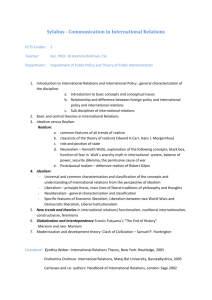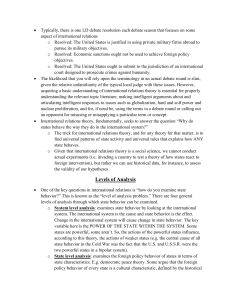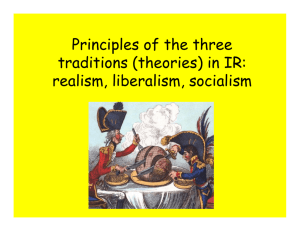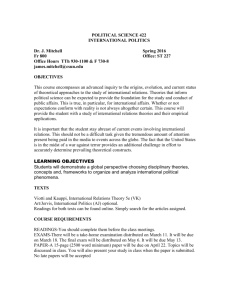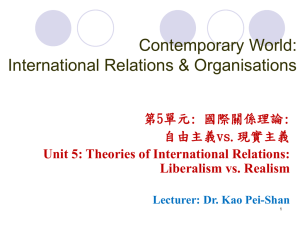Syllabus - Gretchen Schrock
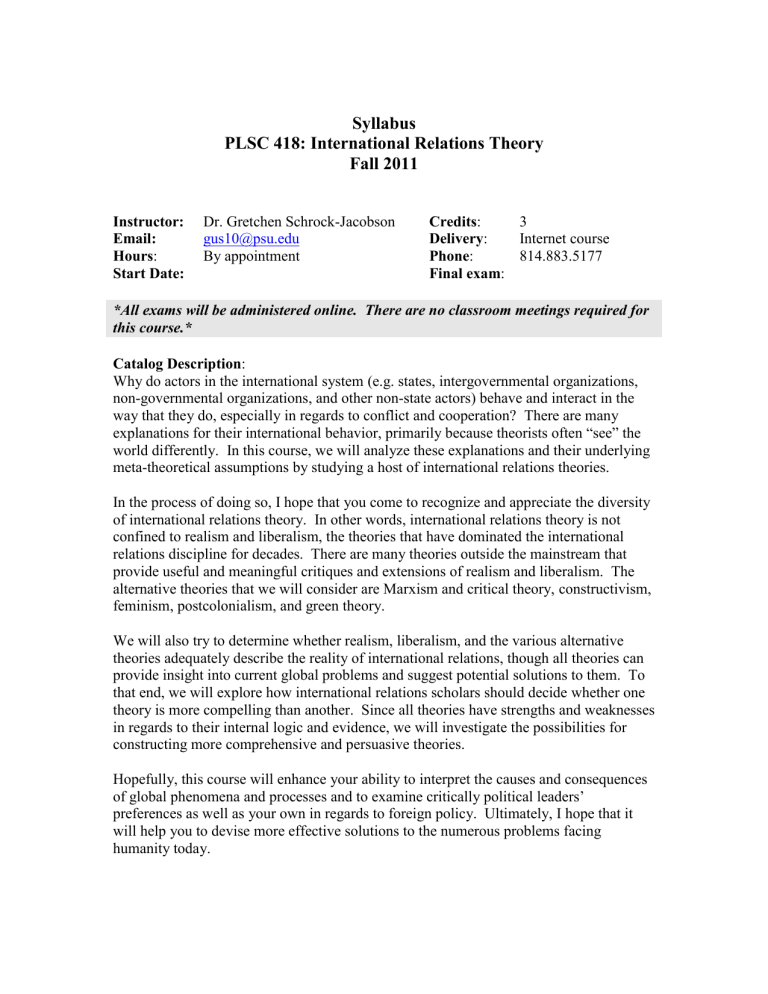
Syllabus
PLSC 418: International Relations Theory
Fall 2011
Instructor: Dr. Gretchen Schrock-Jacobson
Email:
Hours :
Start Date: gus10@psu.edu
By appointment
Credits
Phone
:
Delivery :
:
Final exam :
3
Internet course
814.883.5177
*All exams will be administered online. There are no classroom meetings required for this course.*
Catalog Description :
Why do actors in the international system (e.g. states, intergovernmental organizations, non-governmental organizations, and other non-state actors) behave and interact in the way that they do, especially in regards to conflict and cooperation? There are many explanations for their international behavior, primarily because theorists often “see” the world differently. In this course, we will analyze these explanations and their underlying meta-theoretical assumptions by studying a host of international relations theories.
In the process of doing so, I hope that you come to recognize and appreciate the diversity of international relations theory. In other words, international relations theory is not confined to realism and liberalism, the theories that have dominated the international relations discipline for decades. There are many theories outside the mainstream that provide useful and meaningful critiques and extensions of realism and liberalism. The alternative theories that we will consider are Marxism and critical theory, constructivism, feminism, postcolonialism, and green theory.
We will also try to determine whether realism, liberalism, and the various alternative theories adequately describe the reality of international relations, though all theories can provide insight into current global problems and suggest potential solutions to them. To that end, we will explore how international relations scholars should decide whether one theory is more compelling than another. Since all theories have strengths and weaknesses in regards to their internal logic and evidence, we will investigate the possibilities for constructing more comprehensive and persuasive theories.
Hopefully, this course will enhance your ability to interpret the causes and consequences of global phenomena and processes and to examine critically political leaders’ preferences as well as your own in regards to foreign policy. Ultimately, I hope that it will help you to devise more effective solutions to the numerous problems facing humanity today.
Required Text :
Bruce Bueno de Mesquita, Alastair Smith, Randolph M. Siverson, and James D.
Morrow. 2003. The Logic of Political Survival.
Cambridge, MA: MIT Press.
ISBN 0262025469
Tim Dunne, Milya Kurki and Steve Smith, ed. 2010. International Relations
Theories: Discipline and Diversity . 2 nd
ed. New York: Oxford University Press.
ISBN 9780199548866
Additional Assigned Readings: These readings can be found in the e-Reserves section of the Angel course site.
Website : http://cms.psu.edu
Supplemental information: Supplied by your instructor.
Instructor Feedback and Response Time :
Your instructor will reply to your questions, concerns, and comments in a timely manner, not to exceed two business days. The “I don’t understand” or “Technical Help” message board should be the first recourse for communicating specific questions or problems.
Students are encouraged to respond to the problems and questions posted by their peers.
When corresponding with your instructor or classmates, please use appropriate language and etiquette. Email correspondence should be free of grammatical and mechanical errors. Email slang and lingo is not appropriate in any type of instructional setting. You can expect meaningful feedback on all written assignments within one week of the deadline.
Course Objectives:
Upon successful completion of this course, the student will be able to:
1.
Outline the history of the IR discipline, explain the role of metatheoretical debates and the philosophy of social science in it, and assess the importance of this history for the construction of theories.
2.
Compare and contrast the major tenets of realism, liberalism, and various alternative theories.
3.
Evaluate the evidence for and against each theory.
4.
Use these IR theories to answer questions about international conflict behavior and the extent of global cooperation.
5.
Employ these IR theories to explain current global phenomena.
6.
Identify the strengths and weaknesses of each theory and examine ways to construct more accurate theories.
7.
Recognize the diversity of IR theory and analyze the consequences for understanding international political reality.
Course Organization:
This course is divided into five modules: Introduction to International Relations Theory ,
Realism , Liberalism , Critiques of the Mainstream Theories , and Conclusions .
The first module, Introduction to International Relations Theory , provides a broad historical overview of the international relations discipline, with special attention given to the role of meta-theoretical debates and the philosophy of social science.
The second module, Realism , focuses on the realist paradigm, with specific attention given to classical realism and its founding theorists, structural realism, the issue of polarity, power transition theory, offensive realism, and defensive realism.
The third module, Liberalism , focuses on the liberal paradigm, with special attention given to classical liberalism, the democratic peace theory and its qualifications, diversionary conflict theory, neo-liberalism, and the role of international institutions in global politics.
The fourth module, Critiques of the Mainstream Theories , presents a series of alternative theories to realism and liberalism, namely Marxism and critical theory, constructivism, feminism, postcolonialism, and green theory.
The fifth module, Conclusions , presents two recent phenomena that challenge contemporary international relations theories: terrorism and international migration. This module will also examine the current state of the international relations discipline in terms of its intellectual and social patterns.
There are a series of lessons in each module. One or two lessons are covered each week.
Within each lesson, there is a combination of assigned readings, lecture materials, videos, quizzes, and additional assignments. The quizzes are based on the textbook and lecture materials. The additional assignments include five discussions, six reflection activities, and four blogs. These assignments are spread out over the semester to provide you ample time to learn from each activity.
At the end of the semester, there will be a cumulative final exam; that is, it will cover all of the assigned readings and lecture material from the course.
On Line Learning/Attendance:
This course has been developed to promote asynchronous learning. Students will have a designated time period (as identified on the course schedule) to complete all readings and assignments for each lesson. Students may work at their own pace throughout each lesson but they must adhere to the deadlines as outlined on the course schedule.
Synchronous instruction vs. Asynchronous instruction
This course is an asynchronous course. This means that you do not have to meet on a designated day and time for instruction. The pace of this course is entirely up to you.
However, it is the responsibility of the student to adhere to all deadlines and due dates.
Once the class has completed a lesson, we will move on to the next lesson. (See above
attendance policy). This keeps the class on task and enables students to learn the material over an appropriate period of time.
Grading Policy Points
A= 100%-90%
B= 89%-80%
C=79%-70%
D=69%-60%
F=59%-0%
Graded Assignments Points
Syllabus quiz 10
Discussions (5 x 20) 100
Lesson quizzes (10 x 10) 100
Reflection Activities ( 6 x 30) 180
Blogs (4 x 30)
Final Exam
Total
120
100
610
*All exams will be administered online. There are no classroom meetings required for this course.*
Deadlines:
All assignments are due by 11:55 pm Eastern time on the assigned date (please refer to the course schedule in the Getting Started folder for due dates). Students will be unable to go back and complete course work; it is your responsibility to keep up with your assignments.
Students with an excused absence (hospitalization, jury duty, or family emergencies) may be asked to produce proper documentation in order to make up graded work. All make up work is at the discretion of the instructor.
Course Assignments
1. Syllabus quiz (10 points)
The syllabus quiz has been developed to help you understand the course expectations outlined in the syllabus.
2. Discussion Board Posts (5 x 20 points, 100 total points)
There will be five discussions throughout the semester. They are:
Introduction Discussion
Comparison of Classical Realist Thought Discussion
Polarity Discussion
International Organizations and Peace Discussion
Challenges to IR Theory Discussion
In each discussion (including the introduction discussion), you must post at least one original/initial post and at least two response posts to two different classmates. Please read the “Instructors’ Discussion Board/Forum Policies” found in this document. You can earn up to 20 points for each discussion. Ten points can be earned through the
original/initial post, while the remaining 10 points can be earned through the two response posts to two different classmates.
Discussion Board Posts Grading Rubric (20 points per discussion)
As noted above, you must post three times to each discussion board. You must post at least one original post and at least two response posts.
Excellent
8-10 points
The post responds fully and substantively to the discussion prompt.
It reflects an exemplary understanding of the relevant course materials.
It demonstrates depth of analysis and provides significant insight not otherwise offered.
It generally weighs in as above average in relation to the performance of the class.
It is free of grammatical, mechanical, and citation errors.
Acceptable
5-7 points
The post meets the basic requirements of the discussion prompt.
It reflects a basic understanding of the relevant course materials.
It presents a little information to further the discussion.
It generally weighs in as average in relation to the performance of the class.
It may contain one or two grammatical, mechanical, and citation errors.
Less than acceptable
0-4 points
The post does not meet the requirements of the discussion prompt.
It reflects a weak understanding of the relevant course materials.
It adds little value to the discussion.
It falls significantly below the performance of the class.
It does not follow a logical flow and contains more than two grammatical, mechanical, and citation errors.
Instructor’s Discussion Board/Forum Policies
Try to think of discussion boards as an extension of your real-life classroom. o Communicating through writing is different than communicating orally. o These pointers cover common issues that may help to convey your ideas more clearly and prevent misunderstandings.
For complex posts, try composing in Word, edit, and then copy/paste into Angel. o Or post a simple explanation of contents of a Word file that you attach to the post.
Try to keep related ideas organized under separate threads. o If you’d like to express a new idea in a particular discussion board, create a new post. The title of your post should be a brief phrase which summarizes your post. o If you are replying to someone else’s post, hit “Reply.” Do not create a new post.
Very often people will read postings on a discussion board but not make a reply if it is not required of them. Sometimes students become upset when they see that their post has been read but with no replies. Please do not feel offended.
Do not feel obligated to respond to a post if you feel it does not require a response. Excessive posts that contain no essential new ideas may create more work for everyone.
Please remember that not everyone comes from the same background, or shares the same values and ideals as you.
Please be appropriate, professional, and considerate of others.
Your “tone” is a very important part of electronic communication.
If you are unsure of your tone, try reading your discussion board post out loud before you submit it. o When you read it out loud, does it sound the way you would speak to another student in the classroom?
The point of the discussion board is to share ideas among your classmates, not to prove that you are right and they are wrong.
Differences of opinion are going to occur in any forum, and your goal should be simply to convey your ideas as clearly as possible.
Making a joke or being ironic in a discussion board is a great way to break the ice, but you have to let people know your intentions. Even the most innocent of comments can easily be misunderstood.
If you wish to convey a humorous tone in your discussion board post, try using emoticons (
), add comments like “Just kidding!” Do not use slang.
If you find something on the discussion board that strikes you as upsetting or unacceptable, please be sure to let your instructor know about it as soon as possible . o Very often, the author of the material does not realize how their words
“sound” to you. o Dealing with such issues in a straight-forward manner offers a growth opportunity and should be facilitated by the instructor. o Not dealing with them will undermine group process.
The instructor has the right to remove any discussions that are not appropriate or offend another student. Any student who posts an inappropriate or offensive response will be blocked from participating in the discussion board and will receive an F for that assignment. Students are also subject to the classroom behavior and conduct policies in the student code of conduct.
3. Lesson Quizzes (10 x 10 points, 100 total points)
Each lesson quiz will test your understanding of the major tenets of the theory covered in that lesson. It will consist of 10 objective questions (true/false, multiple choice, and/or
fill-in-the-blank). These questions will come from the assigned readings and the lecture material. You will have 15 minutes to complete the quiz and you will have to do it all in one sitting. You cannot save your work and come back to it.
4. Activities (6 x 30, 180 points)
There are six activities throughout the course, each of which is worth 30 points. Each activity is due by 11:55 pm Eastern Time on the date indicated on the course calendar and must be submitted via the appropriate drop-box in Angel. Take care that your submitted files are easily accessed and readable across operating platforms. Documents should be saved as .RTF (Rich Text Format). Be sure to properly document any and all sources
(quotations, images, etc.).
The Meta-Theoretical Reflection Activity
The goal of this activity is for you to explore your own meta-theoretical assumptions, especially in regards to ontology and epistemology. You are to write a two-page, double-spaced essay that examines your answers to the following questions: (1) what objects should we study in international relations? and (2) how do we obtain knowledge about the world and thus, uncover “truth?”
In the process of doing so, I expect you to compare and contrast your positions with those of rationalists, reflectivists, and/or scientific realists.
The Democratic Peace and American Foreign Policy Activity
The goal of this activity is for you to use democratic peace theory to better understand American foreign policy toward particular states. You are to choose one democratic state and one autocratic state and then compare and contrast
American governmental attitudes and policies toward them in regards to conflict in a two-page, double-spaced essay. You need to determine whether the convergence or divergence of these attitudes and policies can be adequately explicated via the “empirical law” of the democratic peace and its various explanations.
The Marxist Analysis Activity
The goals of this activity are for you to use Marxism to explain international political phenomena and for you to assess the continuing relevance of Marxist thought. You are to choose a fairly recent international political event (e.g. the democratic revolutions in the Middle East) and write a two-page, double-spaced essay that explores how Marxism (or its variations such as world systems theory or neo-Gramscianism) could illuminate the causes, processes, and/or consequences of this event. You should also examine whether Marxism provides a more satisfying explanation of this event than any of the more traditional IR theories (e.g. structural realism or classical liberalism).
The Constructivist Analysis Activity
The goals of this activity are for you to use constructivism to explain international political phenomena and for you to assess its value to the international relations discipline. You are to choose a fairly recent international political event (e.g. the
coalition bombing of Libyan armed forces) and write a two-page, double-spaced essay that explores how constructivism could illuminate the causes, processes, and/or consequences of this event. You should also examine whether constructivism provides a more satisfying explanation of this event than any of the more traditional IR theories (e.g. structural realism or classical liberalism) and thus contributes significantly to our understanding of international relations.
The Essentialism vs. Constructivism Debate in Feminism Activity
The goal of this activity is for you to articulate your position on the essentialism vs. constructivism debate in feminist IR thought. Essentialists argue that aversion to violence is inherent in females due to their reproductive role and that simply having more women in positions of political power will decrease the incidence of war. In contrast, constructivists argue that in order for global peace to obtain, the social construction of masculinity and female subordination must be changed.
Which argument do you find more persuasive? Which mechanism better explains how gender equality affects the outbreak of war? You are to write a two-page, double-spaced essay reflecting on the relationship between the innate peacefulness of women, the social construction of gender roles, and conflict.
The Postcolonial Critique of Traditional IR Theory Activity
The goal of this activity is for you to critique a traditional IR theory (e.g. structural realism or classical liberalism) through the lens of postcolonialism and thereby, gain a sense of the limitations of the “Western canon.” You are to write a two-page, double-spaced essay describing how postcolonialism might critically assess the major tenets of one dominant IR theory and how practitioners in that theoretical tradition might respond. You might want to think about this assignment as a conversation between a postcolonialist and structural realist/classical liberal/etc. about how best to understand and explain international processes.
5. Blogs (4 x 30 points, 120 points)
Over the course of the term, you will complete a course blog. The first three entries will be a brief (approximately one page) reflection on the assumptions, concepts, causal mechanisms, evidence, and/or policy implications of a theory. These entries will be completed at the end of module 2, 3, and 4. So, for example, for your first blog entry at the end of module 2, you should critically examine either classical realism, structural realism, or any of their variations. The last entry will occur at the end of module 5. In this entry, you will be expected to briefly reflect on the future of the international relations discipline in terms of social structure, disciplinary boundaries, subject matter, and/or theoretical debates. Your grade for these entries will be based upon your understanding of the relevant course materials; the degree of critical thinking you demonstrate; and the amount of grammatical, mechanical, and citation errors.
6. Final Exam (100 points)
The final exam will be cumulative in nature and will be composed of 30 objective questions (true/false, multiple choice, and fill-in-the-blank). These questions will come
from the assigned readings and the lecture material throughout the course. You will have access to the final exam for one hour within a 48-hour window.
TECHNICAL SUPPORT
The Technical Help message board should be the first recourse for communicating specific questions or problems. Students are encouraged to respond to the problems and questions posted their by their peers. To access ANGEL’s technical support page, click on the Help button (in the image of a question mark), found on the left of the screen in
ANGEL. Persons needing General ANGEL assistance may call 814-865-4928 between
7:00 a.m. and 5:00 p.m., Monday through Friday. Please use the forms available on the
Help website whenever possible and an ANGEL support expert will assist you.
Turnaround time is generally less than one business day.
University Policies
Academic Integrity
Penn State defines academic integrity as the pursuit of scholarly activity in an open, honest and responsible manner. All students should act with personal integrity, respect other students’ dignity, rights and property, and help create and maintain an environment in which all can succeed through the fruits of their efforts (Faculty Senate Policy 49-20).
Dishonesty of any kind will not be tolerated in this course. Dishonesty includes, but is not limited to, cheating, plagiarizing, fabricating information or citations, facilitating acts of academic dishonesty by others, having unauthorized possession of examinations, submitting work of another person or work previously used without informing the instructor, or tampering with the academic work of other students. Students who are found to be dishonest will receive academic sanctions and will be reported to the
University’s Judicial Affairs office for possible further disciplinary sanction.
Disability Access Statement
Office of Disability Services: http://www.equity.psu.edu/ods/psu_commit.asp
The Pennsylvania State University encourages qualified persons with disabilities to participate in this programs and activities and is committed to the policy that all people shall have equal access to programs, facilities, and admissions without regard to personal characteristics not related to ability, performance, or qualifications as determined by
University policy or by state or federal authorities. If you anticipate needing any type of accommodation in this course or have questions about physical access, please tell the instructor as soon as possible.
Affirmative Action & Sexual Harassment Policy
The Pennsylvania State University is committed to a policy that all persons shall have equal access to programs, facilities, admission, and employment without regard to personal characteristics not related to ability, performance, or qualifications as
determined by University policy or by Commonwealth or Federal authorities. Penn State does not discriminate against any person because of age, ancestry, color, disability or handicap, national origin, race, religious creed, gender, sexual orientation, or veteran status. Direct all inquiries to the Affirmative Action Office , 211 Willard Building,
University Park.
Teach Act Statement
The materials on this course Web site are only for the use of students enrolled in this course for purposes associated with this course and may not be retained or further disseminated.
Syllabus Subject to Change
I anticipate that we will follow the schedule I have outlined here, but I may make adjustments based on what actually happens in class. Be sure to check the syllabus and course schedule regularly to see if assignments have changed. Remaining in the course after reading this syllabus will signal that you accept the possibility of changes and responsibility for being aware of them.
